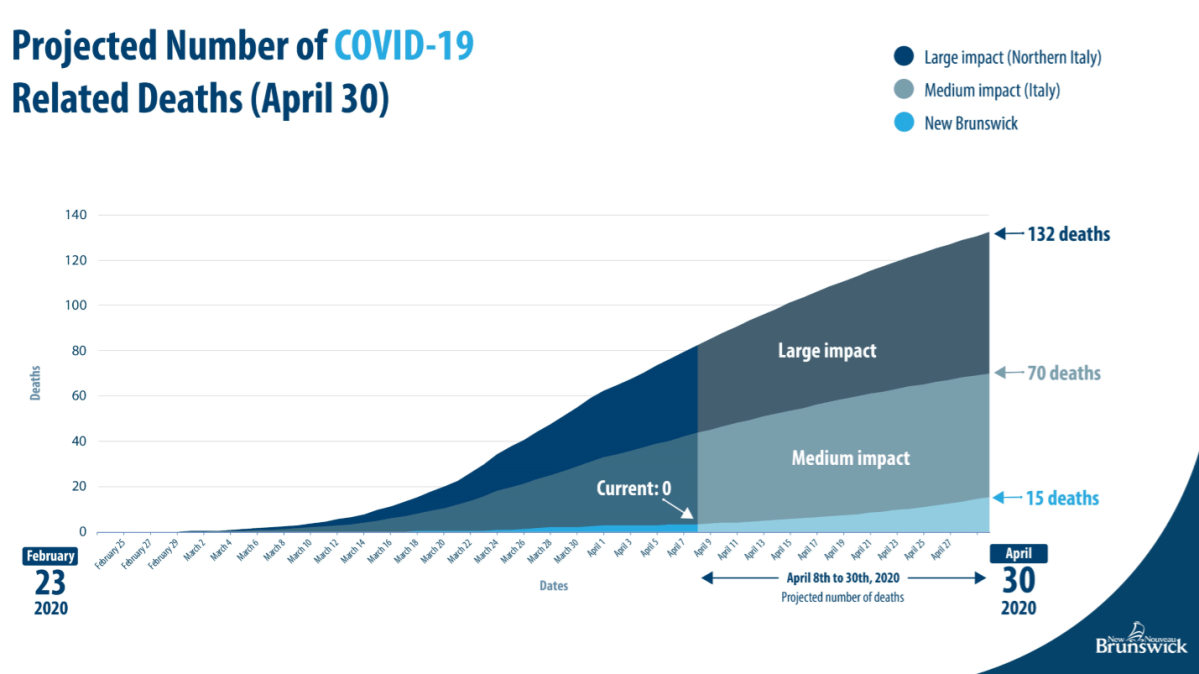New Brunswick’s most recent projections show that even with the province’s strict adherence to physical-distancing and self-isolation measures, between 550 and 1,750 people could die in the province during the course of the novel coronavirus pandemic.

The number of fatalities could have been much higher, reaching 5,600 people, if the province had not implemented public health measures at all, according to data released by the province on Thursday.
“To put that number in perspective, 1,800 New Brunswickers died in the Second World War,” said Premier Blaine Higgs during Thursday’s provincial COVID-19 update.
As of Thursday, there are 111 confirmed cases of COVID-19, the disease caused by the virus, in New Brunswick, meaning the province has detected an additional three cases since its last update on Wednesday.
All of the new cases are in one family, and Higgs said it is the result of one member travelling to Ontario more than a week ago.
READ MORE: New Brunswick issues reminder on religious celebrations
“As we have seen, it can happen to anyone,” said Higgs, acknowledging that the majority of New Brunswickers are complying with the province’s emergency measures.

At this point, only four patients have been placed in intensive care, although that figure is projected to reach as many as 13 patients by April 30.
Acute care hospitalizations are also expected to climb during the same period. There are currently two people hospitalized in acute care, although that is expected to climb to 28.

Get weekly health news
The province also indicates that as many as 15 deaths are projected by the end of the month. No deaths have been recorded as of Thursday.

The province says the public can help change the outcomes for New Brunswickers by continuing to stay at home and comply with physical-distancing measures.
“How this outbreak unfolds is in large measure in the hands of New Brunswickers,” said New Brunswick Health Minister Ted Flemming.
“We can change the outcome by how we conduct ourselves; by staying at home, physically distancing and practising prevention.”
Flemming stressed that the public’s efforts and early discipline have made a difference but said it’s not time to give in.
The health minister urged New Brunswickers to follow the rules as the province heads into the Easter long weekend, saying that the province could see cases double if people don’t do the right thing.

“If we get lax over Easter weekend, these numbers could go out the window,” Flemming said.
New Brunswick says it is continuing to secure personal protective equipment for its front-line health-care workers as well as ensure infection prevention.
The provincial government said it is “aggressively” pursuing new technology to improve testing capacity.
New Brunswick delays fishing season, ends assistance program
Higgs has asked the province’s environment minister to delay the opening of New Brunswick’s sportfishing season for at least two weeks.
The premier said he would reasses that decision at the end of the month.

Higgs also reminded New Brunswickers that the New Brunswick Workers Emergency Income Benefit, a one-time $900 fund administered by the Canadian Red Cross, is closing on Thursday.
With federal programs now opening and distributing money to those who need it, he said that the New Brunswick Workers Emergency Income Benefit is no longer needed.
The fund, which has received tens of thousands of applicants, was only meant to serve as a bridge until those federal assistance programs got underway.
Questions about COVID-19? Here are some things you need to know:
Health officials caution against all international travel. Returning travellers are legally obligated to self-isolate for 14 days, beginning March 26, in case they develop symptoms and to prevent spreading the virus to others. Some provinces and territories have also implemented additional recommendations or enforcement measures to ensure those returning to the area self-isolate.
Symptoms can include fever, cough and difficulty breathing — very similar to a cold or flu. Some people can develop a more severe illness. People most at risk of this include older adults and people with severe chronic medical conditions like heart, lung or kidney disease. If you develop symptoms, contact public health authorities.
To prevent the virus from spreading, experts recommend frequent handwashing and
coughing into your sleeve. They also recommend minimizing contact with others, staying home as much as possible and maintaining a distance of two metres from other people if you go out.
For full COVID-19 coverage from Global News, click here.










Comments